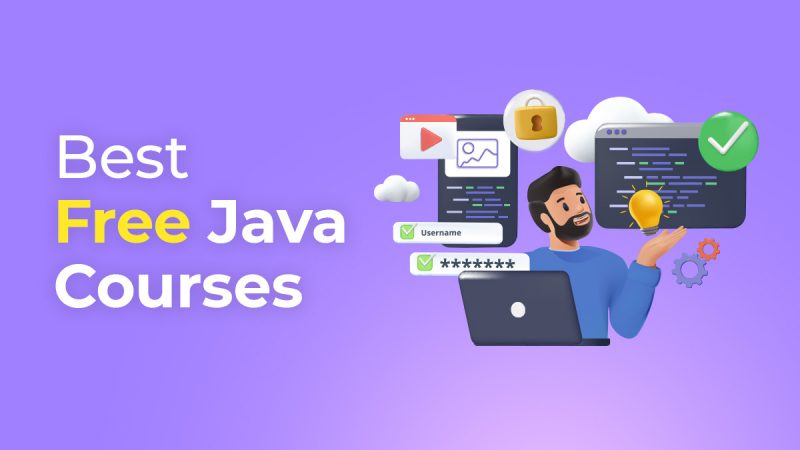- What is Java?
- Why learn Java?
- Top 10 Free Best Online Java Courses with Certificate
- 1. Java Course Online for Beginners by Scaler Topics
- 2. Java Tutorial for Complete Beginners by Udemy
- 3. Object-Oriented Programming in Java by Coursera
- 4. Java Programming by Great Learning
- 5. Core Java Basics by UpGrad
- 6. Practice Java by Building Projects on Udemy
- 7. Java for Absolute Beginners by Udemy
- 8. Java Programming and Software Engineering Fundamentals Specialization by Coursera
- 9. Java 9 New Features In Simple Way: JShell, JPMS and More by Udemy
- 10. Data Structures & Algorithms in Java by Great Learning
- Tips to Choose the Best Online Java Course
- Conclusion
- Frequently Asked Questions About Java Courses
What is Java?
Java is a popular programming language used to develop programs for many different platforms, such as Android, desktop, and online applications. It is a compiled language that creates bytecode that can be translated into machine code and executed on various operating systems. Since its inception in 1995, J Java has developed into a flexible platform that powers a wide range of services and apps we can rely on.
With Java, developers have the power to create software that runs seamlessly on various platforms. From crafting Android smartphone apps to building robust desktop applications and even web systems distributed across networks, Java has got it covered. What makes Java truly remarkable is its ability to transcend boundaries. Java code is compiled into bytecode, a universal language understood by the Java Virtual Machine (JVM). This means that your Java programs can run on different machines, be it a Mac, PC, or Unix computer. The JVM’s Just-In-Time (JIT) compiler even optimizes bytecode on the fly, delivering exceptional performance in real time.
Java’s appeal lies in its user-friendly nature, reliability, robust security measures, and the freedom it provides from platform dependencies. So, whether you’re a developer shaping the future or an end-user benefiting from Java’s capabilities, this programming language remains an indispensable force that keeps our digital lives running smoothly.
Confused about your next job?
Why learn Java?
- Wide Application Scope: Java is widely used for developing enterprise-level applications, web applications, and mobile applications. Its versatility allows developers to write code once and run it on various devices and operating systems.
- High Demand and Lucrative Career Opportunities: Java is one of the most widely used programming languages globally, leading to a high demand for Java developers. Learning Java can open up lucrative career opportunities in various industries.
- Ease of Learning: Java has a straightforward syntax, making it relatively easy to learn, especially for beginners. There are ample online resources available to support the learning process like Scaler Academy.
- Object-Oriented Programming Features: Java’s object-oriented programming (OOP) features make it an excellent language for building large-scale applications. OOP principles provide a modular and organized approach to software development.
- Robust Libraries: Java offers a vast collection of libraries and frameworks that simplify development tasks. These libraries provide pre-built modules for common functionalities, saving developers time and effort.
The real-world example that highlights the power of Java is Netflix. Netflix heavily relies on Java to deliver its streaming service to millions of users worldwide. Java is used in building core components like the recommendation engine, search functionality, content delivery network, and backend systems for user data and analytics. Considering the massive scale of Netflix’s operation, Java’s ability to handle large volumes of data quickly and efficiently is crucial in delivering seamless streaming experiences to users.
In conclusion, learning Java equips developers with a versatile skill set and opens up opportunities to work on complex applications. The language’s widespread use and ongoing popularity ensure that Java will remain relevant for years to come.
Top 10 Free Best Online Java Courses with Certificate
1. Java Course Online for Beginners by Scaler Topics
Embark on an exciting journey into the world of Java programming with Scaler Topics’ Java Course Online for Beginners. Led by Tarun Luthra, a seasoned Software Engineer, and Instructor, this course equips you with the fundamental knowledge and core concepts of Java, the most widely used programming language.
Starting from the basics, this Java online course covers everything you need to know as a beginner, gradually paving the way for more advanced Java topics. With its well-structured modules, each focusing on a relevant aspect, the course ensures that you grasp the essential foundations required to specialize in Java. Whether you aspire to become a Java expert or simply want to understand the language, this certification course provides a clear path to success.
Average Rating: 5
Certificates: All candidates get certificates on Completion of the course.
Check out more on all the course offerings here.
2. Java Tutorial for Complete Beginners by Udemy
Are you ready to dive headfirst into the world of Java programming? Look no further than the Java Tutorial for Complete Beginners by Udemy. This comprehensive course is designed to teach you the art of programming using the Java language. The best part? You don’t need any prior programming knowledge to get started—just a desire to learn and a basic fluency with computers.
Through engaging video lessons, you’ll gradually unlock the secrets of Java programming, from fundamental concepts to more advanced techniques. This course is tailored for anyone who wants to learn Java, regardless of their background or experience. So, whether you’re a curious beginner or an aspiring developer, join this course and embark on an exciting journey to master the Java programming language.
3. Object-Oriented Programming in Java by Coursera
Welcome to Coursera’s Object-Oriented Programming in Java course, where you’ll embark on an exhilarating adventure into the realm of Java programming using data visualization. This intermediate-level course is designed to cater to a diverse range of goals and aspirations. Whether you dream of becoming a professional software developer or simply want to enhance your programming skills for personal projects, this course has got you covered.
With a focus on Object Oriented Programming, you’ll not only learn how to create advanced Java programs but also explore the power of existing libraries, build captivating graphical user interfaces, and master core algorithms for data searching and sorting. As a project-based course, you’ll dive right into practical applications, ensuring that you gain hands-on experience from the start. Join us, and together we’ll unleash your full potential in Java programming.
4. Java Programming by Great Learning
Discover the fascinating world of Java programming with Great Learning’s Java Programming Course. This comprehensive course covers everything from the very basics of Java to advanced concepts, ensuring that you gain a solid foundation in this powerful programming language.
Starting from scratch, you’ll be guided through the essential building blocks of Java, including Variables, Data Types, and Operators. As you progress, you’ll explore Functions, Arrays, and even write your first Java program. Each topic is presented with clear explanations and practical examples, making it easy to grasp and apply your newfound knowledge. From a brief introduction to the Java programming language to detailed information on Java IDE installation, this course equips you with the skills and confidence to embark on your Java programming journey.
5. Core Java Basics by UpGrad
Are you ready to embark on a thrilling adventure into the world of Java programming? UpGrad’s Core Java Basics course is your ticket to mastering the fundamentals of programming with Java. This beginner-friendly course dives deep into essential topics such as Variables, Data Types, loops, conditionals, and functions, empowering you to solve problems with confidence.
In this engaging course, you’ll not only learn about variables and data types but also explore command line and integrated development environments. From casting and arrays to strings and characters, you’ll cover a wide range of Java concepts. With a blend of theory and practical examples, you’ll
6. Practice Java by Building Projects on Udemy
Are you ready to level up your Java skills and ace your job interviews? Look no further than the “Practice Java by Building Projects” course on Udemy! This ultimate Java interview prep course focuses 100% on applying object-oriented design in real-world applications. Say goodbye to boring flashcards and quizzes, and say hello to hands-on practice!
In this course, we’ll guide you through building realistic projects from scratch. We’ll approach each program analytically, outlining our solution approach, and then we’ll dive into writing the code to bring our applications to life. Along the way, you’ll learn how to understand client scenarios, analyze problems, and apply the core principles of object-oriented design. Get ready to code like a pro!
7. Java for Absolute Beginners by Udemy
Have you ever wanted to learn programming from scratch but felt intimidated by technical jargon? Look no further than the “Java for Absolute Beginners” course on Udemy! This course is designed for complete beginners who want to dive into the world of computer programming using plain English explanations. No previous coding experience is required!
In “Java for Absolute Beginners,” we’ll take you on a journey from the basics to more advanced topics, all explained in easily digestible videos. Say goodbye to long-winded explanations and hello to straightforward concepts that you can piece together with ease. Plus, you’ll get coding exercises at relevant stages, allowing you to practice what you’ve learned. Start your programming journey today!
8. Java Programming and Software Engineering Fundamentals Specialization by Coursera
Dreaming of a career as a software engineer? Take your first step with the “Java Programming and Software Engineering Fundamentals Specialization” on Coursera! This comprehensive program will introduce you to the foundations of programming and software development, focusing on the popular Java language and its role in the Android operating system.
Whether you’re a beginner or have some programming knowledge, this Specialization is designed to teach you core programming concepts and equip you with the skills to solve complex problems. From designing algorithms to testing and debugging your programs, you’ll gain the essential skills needed in the real world. Explore the exciting world of software engineering today!
9. Java 9 New Features In Simple Way: JShell, JPMS and More by Udemy
Ready to dive into the latest features of Java 9 and stay ahead in the ever-evolving programming landscape? Enrol in the “Java 9 New Features In Simple Way: JShell, JPMS, and More” course on Udemy! This course is your passport to understanding the newest additions to Java 9, even if you’re not familiar with older versions.
With direct classroom videos, you can learn about the exciting new features introduced in Java 9 from anywhere. You’ll gain an overview of the updates and dive deep into topics like private methods in interfaces, enhancements to try-with-resources, diamond operator improvements, and much more. Stay ahead of the curve and enhance your Java skills with this engaging and informative course!
10. Data Structures & Algorithms in Java by Great Learning
Embark on a fascinating journey into the world of Java programming with Great Learning’s Data Structures & Algorithms in Java course. This free course is taught by industry experts, providing you with a comprehensive understanding of basic concepts such as complexity, recursion, and the Tower of Hanoi.
Perfect for beginners, this course teaches you how to store and organize data efficiently through data structures and algorithms. Starting with the significance of data structures, you’ll learn about algorithms and time complexity, and dive deep into recursion, including recursive functions and recursive trees. The course also covers sorting algorithms in detail. Enroll now and get a free certificate while realizing your career goal of acquiring advanced software skills with Great Learning’s Software Development Courses.
| Course | Price | Features |
|---|---|---|
| Scaler Topics: Free Java Certification Course | Free | |
| Udemy: Java Tutorial for Complete Beginners | Free | |
| Coursera: Object-Oriented Programming in Java | Free | |
| Great Learning: Java Programming | Free | |
| UpGrad: Core Java Basics | Free | |
| Udemy: Java Database Connection: JDBC and MySQL | Free (No Certificate) Paid (Certificate included) | |
| Udemy: Eclipse IDE for Beginners: Increase Your Java Productivity | Free (No Certificate) Paid (Certificate included) | |
| Coursera: Java Programming and Software Engineering Fundamentals Specialization | Free | |
| Intellipaat: Java Complete Course | Free | |
| Great Learning: Data Structures & Algorithms in Java | Free | |
Tips to Choose the Best Online Java Course
- Flexibility and Convenience: Break free from rigid schedules! Seek out courses that offer flexible learning options, allowing you to study at your own pace and convenience. Choose a course that fits seamlessly into your busy life, so you can unlock the world of Java programming without sacrificing your other commitments.
- Determine Your Skill Level: Are you a complete newbie or do you have some programming experience under your belt? Identifying your skill level is crucial in selecting the right course. Look for courses that cater to your specific needs, whether you’re a beginner seeking a solid foundation or an intermediate learner eager to enhance your Java prowess.
- Look for Hands-On Learning Opportunities: Learning by doing is the secret sauce to mastering Java programming. Seek courses that provide ample hands-on exercises and projects, allowing you to apply your newfound knowledge in practical scenarios. After all, the best way to learn Java is by rolling up your sleeves and diving into coding adventures!
- Look for Additional Resources: In the vast realm of Java, having access to supplementary materials can be a game-changer. Look for courses that offer comprehensive resources such as coding examples, practice problems, cheat sheets, and online communities. These resources will be your trusty companions, providing extra support and deepening your understanding of Java concepts.
- Real-World Applications: Don’t settle for theoretical knowledge alone. Look for courses that emphasize real-world applications of Java programming. Practical examples and case studies will help you bridge the gap between theory and practice, ensuring that you’re equipped to tackle real-life coding challenges.
- Credibility: When it comes to online courses, trust is key. Research the credibility of the course provider by reading reviews, checking instructor qualifications, and assessing the course content. Look for courses offered by renowned institutions, industry experts, or platforms with a solid reputation. Investing in a credible course ensures that you’re learning from the best.
- Look for Interactive Learning Opportunities: Learning Java shouldn’t be a solitary journey! Seek courses that foster interactive learning environments. Whether it’s through live Q&A sessions, discussion forums, or peer collaboration, interactive elements create a vibrant learning community that can boost your understanding and keep you motivated.
- Consider the Cost: While quality education is priceless, it’s essential to consider the cost of the course. Compare prices, but also evaluate the value you’ll receive. Look for courses that offer a balanced combination of affordability and quality. Remember, the right investment in your education can unlock endless possibilities in your Java programming career.
- Check the Course Duration and Time Commitment: Time is a valuable resource, so it’s crucial to assess the course duration and the time commitment required. Consider your availability and how much time you can dedicate to learning Java. Look for courses that align with your schedule and strike a balance between comprehensive content and a manageable timeframe.
Conclusion
Java is one of the most widely used programming languages worldwide, making it an essential skill for developers. You don’t have to go to college or spend a lot of money to learn Java. Start with a free online course that fits your schedule and learning style. These courses range from beginner to advanced levels, each with a unique approach and methodology. There are various free courses available on various platforms to help you learn Java including Scaler Topics, Udemy, and Coursera. Some courses focus on teaching you the basics, including data types, operators, and loops, while others focus on advanced concepts like object-oriented programming, algorithms, and data visualization.
With the wealth of information and the hands-on experience offered by these courses, you will be well on your way to mastering the Java programming language. Whether you are pursuing a career as a software engineer or looking to enhance your skills, these courses provide a solid foundation for any learner to build upon. So why wait? Sign up for a course today and start your journey to becoming a Java expert!
Frequently Asked Questions About Java Courses
Q.1: Can I get Java certification for free?
Ans: Yes, there are courses free Java certification courses by Scaler, Java Tutorial for Complete Beginners by Udemy, Core Java Basics by UpGrad, and more that provide free Java certification courses online.
Q.2: Will Java Certification get me a job?
Ans: While Java certification alone may not guarantee a job, it can certainly enhance your job prospects. A Java certification demonstrates your proficiency in Java programming and can give you an edge over other candidates who do not have a certification.
Q.3: What is the highest-paid job in Java?
Ans: It is difficult to pinpoint the exact highest-paid job in Java as salaries can vary greatly depending on various factors such as the company, job location, level of experience, and specific skills required. However, some of the highest-paying Java jobs include Java software architect, Java solutions architect, Java technical lead, Java development manager, and Java enterprise architect.
Q.4: Is It Worth Getting Java Certified?
Ans: Yes, getting Java certified can be worth it. Having a Java certification can make you stand out to potential employers, demonstrate your expertise in the language, and keep you updated on the latest developments in the Java ecosystem. However, it is important to note that certification alone may not be enough to secure a job and that practical experience and a portfolio of work are also important factors.




